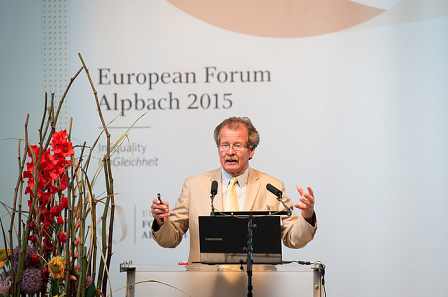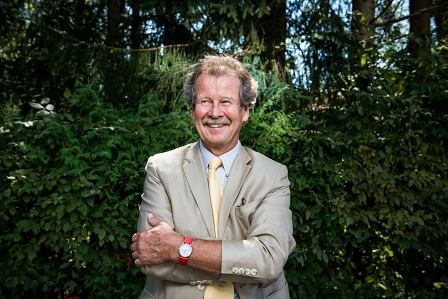Erstellt am: 28. 8. 2015 - 10:24 Uhr
"We Have Made Them Dependent On Smugglers"
“History repeats itself, first as tragedy and then again as tragedy” - Louis de Bernieres
The discovery of dozens of dead migrants on Austria’s A4 motorway is just one more gruesome chapter in the mounting refugee crisis that has dominated this European summer. On Wednesday we heard that scores of bodies had been found on a Libyan boat. At the same time as the story in Burgenland was breaking came the news that a boat packed with migrants sank off the Libyan coastal city of Zuwara.
At the European Forum in Alpbach I met human rights lawyer Manfred Nowak and asked him what sort of responsibility European politics has for these human tragedies?:
Nowak: The refugee crisis and the catastrophes that are happening in the Mediterranean Sea are absolutely outrageous. It is because the European Union and its member states do not grant refugees the possibility to travel legally to the territory of the European Union in order to apply for asylum or have fair asylum procedures.
In fact it is made almost impossible for them to apply for asylum and that is why they need smugglers. That’s why the smugglers are treating them as they do and that is why so many thousands of people have died.

Philipp Naderer
Chris Cummins: What could change?
Manfred Nowak: There is an urgent need for the European Union to come back to its original idea of developing a genuine European asylum and migration policy. Presently it is still the 28 member states that are dealing with the issue. We need a common European asylum office and a common European asylum procedure. This means on the one hand it will be fair. It might also allow for the EU to say migrants could lodge asylum applications from outside the borders of the European Union. If they have the opportunity of a fair asylum process – at least a first screening – then they should be allowed to enter the European Union. I would say they should choose their country of destination according to where they might have family or understand the language. If it turns out this is highly unequal then we’d have to have some sort of quota system.
Of the 18 million Syrians who have fled the fighting, the majority have moved to other parts of Syria as Internally Displaced People* and most of the rest have moved the neighbouring states like Jordan, Turkey or Lebanon. Only around a quarter of million have reportedly entered the EU. That is a lot of people but have we been guilty of exaggerating the scale of the flow?
Yes I think we have exaggerated. Most people prefer to stay in their familiar surroundings for cultural and linguistic reasons. Only those with some resources and who are very desperate are trying to reach Europe. And Europe is one of the most prosperous regions in the world. It is not true that everything is overcrowded. If the political will was there we would be able to integrate many more of the refugees.
Is it also a question of mixed messages? While leaders like Angela Merkel say they are “sickened” by the hostility towards refugees or would-be migrants, on the border of Hungary a fence with rolls of razor wire has been put up. We tell our citizens to have compassion and put up barbed wire as if these desperate people are enemies. Is it surprising the hostility is breeding?
I have to say what is happening at the moment is really a scandal. Europe cannot go on treating people who are in danger and who need protection in this way. As long as this policy is in place where every state is trying to get rid of refugees and try to hand over the burden to other states we will not reach any sort of common policy. If politicians in Germany or Austria are blaming the European Union for not having done enough this is hypercritical because the European Commission, the European Parliament and the institutions have done quite a lot in order to harmonise the whole asylum policies. It was always the ministers in member states who blocked stronger action within the union. It is the member states that would have to change their policies. Maybe it is not a good idea that asylum issues are the portfolios of the ministries of the interior or of the police. We have good example of where an asylum officer is part of the ministry of foreign affairs. That might help get a better consensus.

Luiza Puiu
Are the words that politicians use important? We have heard leaders like the UK Prime Minister David Cameron talk of “swarms” of migrants. I have heard of “hordes” of migrants. Those aren't words of compassion?
That is a trend we have seen since the 1990s and the end of the Cold War. Right-wing parties talk about these people in a very discriminatory way and then mainstream parties pick them up. I think they should realise they have a responsibility. We are not talking about migrants we are talking about refugees according the Geneva Refugee Convention. They are in need of protection and we are under a legal obligation to provide that protection. We are obliged to help them lodge an application for asylum following the rule of law.
It seems to me we were talking about a “refugee crisis” in spring now we are always discussing a “migrant crisis”. What happened?
In the 1990s and the early 2000s we had more people who were actually economic migrants who used or misused the asylum procedures in order to have easier access to Europe. But at the moment we are dealing with major wars and crises that produce genuine refugees. We must make this distinction. Many politicians intentionally mix these things up in order to raise negative sentiments. These refugees are fleeing very dangerous situations. Most people who are dying in the Mediterranean, most people who are coming via Serbia and Hungary are not migrants they are genuine refugees.


